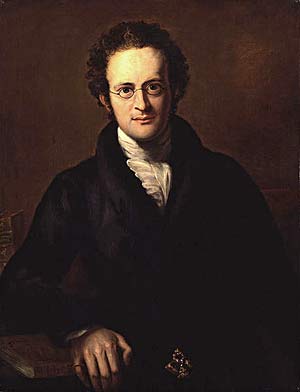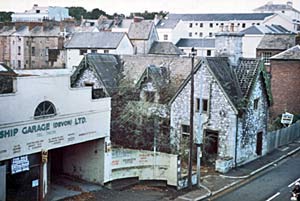
Sir John Bowring
Born Little Larkbeare, Exeter 1793, died Claremont, Exeter, 1872
Page added 17th June 2010
Return to Exeter People Menu
Of all the people born into Georgian Exeter, the polymath, Sir John Bowring had arguably the most diverse and interesting influence on affairs of state. He advised on the introduction of double entry accounting methods for government, indirectly caused the destruction of Parliament by fire and started the second Opium War.
The Bowring family lineage can be traced back to the 16th Century, when they held the manor of Bowringsleigh in the parish of West Alwington in the South Hams. By the middle 17th Century, the family turned up as dissenters in Chulmleigh. Brothers, Benjamin and Nathanial Bowring were apprenticed to a city fuller around about 1725, and established the Bowrings as working fullers in Exeter. The family were never part of the establishment, and remained fullers and cloth merchants, never gaining office in the Company of Weavers, Fullers and Shearmen. Bowring's father, Charles, was Benjamin's grandson.
John Bowring was born on the 17th October 1793 in Little Larkbeare, the family house attached to the woollen workshops and rack fields that were leased from John Baring of Larkbeare, whose own woollen business was located on the opposite side of Holloway Street, at Larkbeare House.
In 1803, the young Bowring was sent off to a Unitarian boarding school in Moretonhampstead, where he remained for three years. In 1807, he went to work for Robert Kennaway, a wool merchant who was fast diversifying into wine, as the wool trade was in collapse. Kennaway loaned the young John books, and encouraged him to learn Spanish and Portuguese, both useful for a wine merchant; by the age of 16, it was said he had mastered Spanish, Italian and Portuguese, plus he could speak well in Dutch and German. Later in life, some said that he knew 200 languages and was proficient in 100. In 1811, John Bowring went to work as a clerk for Milford and Co., in London, travelling to Spain several times from 1813 for the company. He married Maria Lewin during 1816 and started his own mercantile business in 1817.
The literary man
During the following years, Bowring translated Spanish, Polish, Russian, Serbian and other poetry, contributed to the Westminster Review, which he edited from 1825, and encouraged the people of Spain, Greece and Portugal to push for political reform. In 1820, he became a close friend of Jeremy Bentham, an elderly utilitarian, political philosopher who believed in free trade. All this, along with his work as secretary of the Peace Society from 1820, and publishing his first book of hymns in 1823, diverted his attention from his business, and by 1827 he was bankrupt.
However, Bowring had been noticed by the Government for his intellectual prowess, and he was recommended to travel to Holland to report on their public accounts. By 1831 he was appointed as secretary to a Royal Commission, looking into overhauling the nations accounts. At that time, wooden tally sticks were still used to keep a record of expenditure for the Government; the Admiralty had introduced double entry accounts in 1832.
The 'Unintentional Incendiary'
In 1834, the Government followed Bowring's recommendation, and introduced a modern system for public accounts, based on the, by now, established double entry book keeping. Ironically, as the old tally sticks were being burnt, an overheating stove started a fire in the House of Lords Chamber, and spread throughout most of the Palace of Westminster, destroying most of it. Bowring later commented that he was the 'unintentional incendiary' for the conflagration. The nations official weights and measures were also lost in the fire, eventually leading to another Royal Commission that would consider the introduction of metric measures and as a side issue, a decimal monetary system. Bowring was a passionate advocate of decimalisation, and in 1854 he was responsible for the introduction of the florin, worth two shillings, or a tenth of a pound sterling, as a first step towards the system. It would not be until 1972 that Britain adopted full decimalisation.
Free Trade and Corn Laws
John Bowring's long enthusiasm for free trade led to his support for the Anti-Corn Law League. The 1804, Corn Law, imposed a tariff on imported wheat to protect domestic farmers, and led to high bread prices in the growing factory towns and urban conglomerations of the country. The League was formed in 1839, by Richard Cobden and John Bright, two men who are forever associated with repealing the Corn Laws – their work may not have succeeded without Bowring working from within the establishment to convince Prime Minister Sir Robert Peel that free trade and the Corn Laws were incompatible.
In the years between the destruction of the Palace of Westminster and its rebuilding to a design of Charles Barry, the Commons and the Lords met in the hastily repaired White Chamber and Painted Chamber respectively. It was in the White Chamber, as MP for Clyde Burghs (1835-137) and Bolton (1841-1849) that Bowring lobbied for free trade, the repeal of the Corn Laws and decimalisation. He was in all events, a poor Commons speaker and it was his substantial intellect rather than oratory skills that influenced the political map.
Away from the Commons, John Bowring invested heavily, along with his brother Charles, in an iron-works in South Wales, which became known as Bowrington. A downturn in the market saw the venture collapse in 1847, and the MP for Bolton facing financial difficulties again. Despite his failure, he was remembered with affection in Wales for an enlightened attitude to his workforce.
Sent to China
It was the failure of the Bowrington enterprise that persuaded Prime Minister Palmerston to offer him the Consulship of Canton (Guangzhou), in 1849. He worked to open trade with China, but the Mandarins of Canton obfuscated at every turn. In 1854 he was offered the Governorship of Hong Kong, where he continued his efforts to open up trade with China. The Chinese authorities continued to drag their heels regarding a previous agreement on free trade, much to Bowring's annoyance. In 1856 a British flagged ship, the Arrow was attacked at Canton, the action which caused Bowring to order that the city be shelled – thus the Second Opium War was started. From a young liberal free trader, Bowring had swung 180 degrees to become a purveyor of Britain's gunboat diplomacy. He was the target of several Chinese assassination plots, one of which in 1857, using arsenic poisoned bread, was probably responsible for his wife's early death in 1858 and his own ill health several years later.
He resigned in May 1859, and on his voyage home his ship, the Alma, struck a rock in the Red Sea, marooning the crew and passengers on a coral reef for three days. On his return, he married the much younger Deborah Castle from Bristol. He was asked to conduct a trade mission for the Government to Italy in 1860, but was taken ill while in Rome – although he was recovered by 1862, this was the end of his career.
Retirement
In the last years of his life, Sir John Bowring built Claremont, in Exeter and involved himself in County affairs. He was instrumental in founding the Devonshire Association, and also utilised his language skills to make a definitive study of Devon dialect. He died at Claremont on the 23rd November 1872, and was buried in Higher Cemetery. Sir John Bowring was a remarkable man, who without holding high office, and despite his actions in China, can be considered a man of considerable positive influence in national affairs.
Sources: Sir John Bowring, 1792-1872 - Aspects of his Life and Career, edited by Joyce Youings, historyhome.co.uk/people/bowring.htm, Unitarian Universalist Association website.
 Sir John Bowring.
Sir John Bowring.  Little Larkbeare in Holloway Street. Photo courtesy Dick Passmore.
Little Larkbeare in Holloway Street. Photo courtesy Dick Passmore.
│ Top of Page │